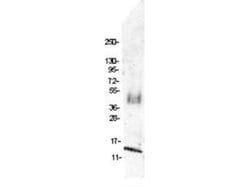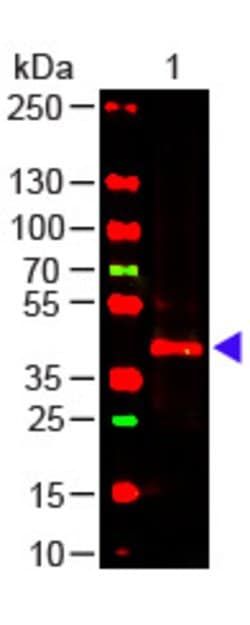MIP-1 beta Polyclonal Antibody, Rockland™
Rabbit Polyclonal Antibody
Manufacturer: Fischer Scientific
The price for this product is unavailable. Please request a quote
Antigen
MIP-1 beta
Applications
ELISA, Immunoprecipitation, Western Blot
Conjugate
Unconjugated
Host Species
Rabbit
Target Species
Porcine
Gene Accession No.
Q711P4
Gene ID (Entrez)
396668
Immunogen
This protein-A purified antibody was prepared from whole rabbit serum produced by repeated immunizations with recombinant protein raised in yeast, corresponding to the 69 amino acids of the mature swine CCL4/MIP1beta protein.
Content And Storage
Store at 4°C short term. For long term storage, store at -20°C, avoiding freeze/thaw cycles.
Gene
CCL4
Concentration
1 mg/mL
Classification
Polyclonal
Form
Liquid
Regulatory Status
RUO
Formulation
0.02M potassium phosphate with 0.15M NaCl and 0.01% sodium azide; pH 7.2
Gene Alias
ACT2; ACT-2; AT744.1; CC chemokine ligand 4; C-C motif chemokine 4; C-C motif chemokine ligand 4; CCL4; chemokine (C-C motif) ligand 4; G-26; G-26 T-lymphocyte-secreted protein; HC21; immune activation gene 2; Immune activation protein 2; LAG1; LAG-1; Lymphocyte activation gene 1 protein; Macrophage inflammatory protein 1-beta; macrophage inflammatory protein-1 beta; MGC104418; MGC126025; MGC126026; MIP-1 beta; MIP1B; MIP-1B; Mip1-b; MIP1B1; MIP1beta; MIP-1BETA; MIP-1-beta; MIP1-beta; MIP-1-beta(1-69); MIP-1-beta(3-69); PAT 744; Protein H400; RP23-320E6.8; SCY4A; SCYA2; Scya4; secreted protein G-26; SIS-gamma; small inducible cytokine A4; small inducible cytokine A4 (homologous to mouse Mip-1b); Small-inducible cytokine A4; T-cell activation protein 2
Gene Symbols
CCL4
Primary or Secondary
Primary
Product Type
Antibody
Description
- Store vial at 4°C prior to restoration
- For extended storage aliquot contents and freeze at -20°C or below
- Avoid cycles of freezing and thawing
- Centrifuge product if not completely clear after standing at room temperature
- This product is stable for several weeks at 4°C as an undiluted liquid
- Dilute only prior to immediate use
- This antibody is specific for swine CCL4 protein
- A BLAST analysis was used to suggest cross-reactivity with CCL4 from swine sources based on 100% homology with the immunizing sequence
- Partial reactivity is expected against horse and panda CCL4 based on 90% homology
- Cross-reactivity with CCL4 from other sources has not been determined
- The swine CCL4 sequence is also 86% homologous to swine CCL3L1
- CCL4 (macrophage inflammatory protein 1-beta, MIP1B) belongs to the intercrine beta (chemokine CC) family
- Functionally, CCL4 is involved in chemotactic and proinflammatory effects, and homeostasis
- CCL4 is produced by macrophages upon stimulation by bacterial endotoxins
- CCL4 recruits and stimulates various inflammatory cells at sites of inflammation
- CCL4 is produced by lymphocytes, macrophages and dendritic cells
- Both CCL4 and the related protein CCL3 participate in the host response to invading bacterial, viral, parasite and fungal pathogens by regulating the trafficking and activation state of selected subgroups of inflammatory cells
- While both CCL4 and CCL3 exert similar effects on monocytes, their effect on lymphocytes differ, with CCL4 selectively attracting CD4+ lymphocytes and CCL3 selectively attracting CD8+ lymphocytes
- Additionally, both have been shown to be potent chemoattractants for B cells, eosinophils and dendritic cells
- The processed form of CCL4 can induce down-modulation of surface expression of the chemokine receptor CCR5, thus inhibiting the CCR5-mediated entry of HIV-1 in T cells
- CCL4 binds with high affinity to CCR5 receptors.


